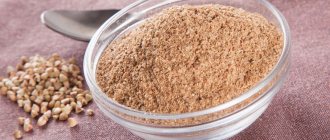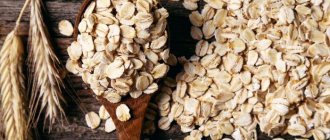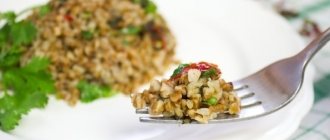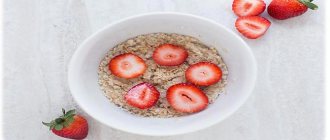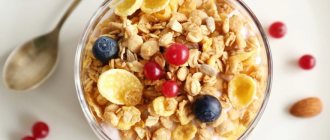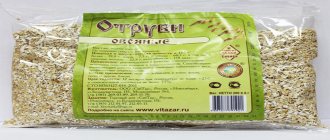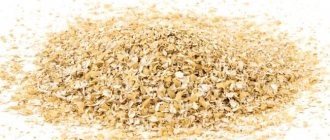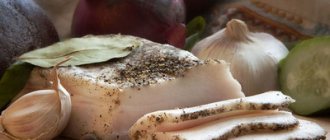The issue is quite controversial. Some nutritionists believe that heat treatment destroys the vitamins contained in oatmeal, and the porridge becomes useless. In addition, dry cereal contains healthy fiber. Other experts in healthy and sports nutrition highlight the problem of intestinal stagnation, which arises precisely because of the consumption of dry oatmeal. So what is the situation really like? To understand, you need to study the beneficial properties and contraindications of the product.
What are raw oats?
Oats are a widely consumed whole grain.
Since your body cannot digest the kernels, they must be processed as follows (1):
- Separation of husks from oatmeal
- Heat and wet treatment
- Flattening or shredding
The end products are oat bran, oat flour or rolled oats (rolled oats).
Oatmeal is a very popular breakfast item and can be eaten either cooked or raw.
This means you can cook them, such as when making oatmeal or soup, or enjoy them cold, such as adding raw oatmeal to smoothies.
However, due to the heating process that all oat kernels undergo to make them easily digestible and digestible, raw oats are technically cooked.
Raw oats are rolled oats that have been heated during processing but not cooked for use in recipes such as oatmeal.
Rinse oatmeal
Many people believe that there is no need to rinse oatmeal, but this is absolutely not true. When cooking flakes, gray foam may form, the dish acquires an unpleasant earthy aroma and gives off bitterness. That is why it is advisable to rinse the oatmeal before cooking.
You need to pour water over the flakes, stir, and leave for a few seconds. Then pour into a sieve to drain the dirt along with small particles.
You can pour the cereal into a colander or sieve. Pour water on top. Let the liquid drain well.
Sometimes oatmeal is washed to improve the taste and structure of the porridge. Small particles, such as starch and flour, add stickiness, a slimy texture, and the dish becomes jelly-like.
Rare shot: Viktoria Isakova showed her grown-up daughter from Yuri Moroz (new photo)
A Brazilian travels 36 km by bike every day to take his loved one home.
Why French children behave well: eight ways to raise them
Oatmeal is rich in nutrients
Although oats are best known for the fiber and plant protein they contain, they also contain other nutrients (2).
An 80-gram serving of raw oats contains (3):
- Calories: 307 kcal
- Carbohydrates: 55 grams
- Fiber: 8 grams
- Protein: 11 grams
- Fat: 5 grams
- Magnesium: 27% of recommended daily intake (RDI)
- Selenium: 43% of RDI
- Phosphorus: 27% of RDI
- Potassium: 6% of RDI
- Zinc: 27% of RDI
In addition to being rich in nutrients like magnesium, selenium, and phosphorus, oats contain soluble fiber, a type of healthy dietary fiber that forms a gel-like substance when digested (4).
The main type of soluble fiber in oats is beta-glucan, which is responsible for most of the cereal's benefits (5).
Oats are also rich in highly digestible plant protein and provide more of this nutrient than many other grains.
In fact, the protein structures in oats are similar to those of legumes, which are considered to have high nutritional value (6).
Oats contain higher amounts of soluble fiber and high-quality protein than other grains, as well as many vitamins and minerals.
Health Benefits of Oats
Because oats contain many health-promoting compounds, they provide multiple health benefits (7, 8, 9).
May Help Lower Cholesterol Levels
Oats are rich in soluble fiber beta-glucan, which has been shown in several studies to lower cholesterol (10, 11, 12, 13, 14).
Beta-glucan works by forming a gel in the small intestine. This gel limits the absorption of dietary cholesterol and prevents the reabsorption of bile salts, which play an essential role in fat metabolism (15, 16).
Research has shown that daily doses of at least 3 grams of oat beta-glucan can reduce blood cholesterol levels by 5 to 10% (10).
What's more, a test-tube study found that raw oats release about 26% of their beta-glucan during digestion, compared to only 9% for cooked oats. Thus, raw oatmeal may have a greater effect on fat metabolism and cholesterol levels (11).
May help control blood sugar
Controlling your blood sugar levels is vital to health and is especially important for people with type 2 diabetes or those who have difficulty producing or responding to insulin, the hormone that regulates blood sugar levels.
Beta-glucan has been shown to help control blood sugar levels due to its ability to form a gel-like substance in your digestive system.
Viscosity slows the rate at which your stomach emptys its contents and digests carbohydrates, which is associated with lower post-meal blood sugar levels and stabilized insulin production (17, 18).
A review of 10 studies of people with type 2 diabetes found that daily consumption of foods containing at least 4 grams of beta-glucan per 30 grams of carbohydrates for 12 weeks reduced blood sugar levels by 46% compared with the control group. (19, 20).
May Benefit Heart Health
High blood pressure is a risk factor for cardiovascular disease and is one of the most common conditions and a leading cause of death worldwide (9, 21).
Soluble fiber, such as beta-glucans in oats, has been linked to blood pressure-lowering effects (22).
One 12-week study of 110 people with untreated high blood pressure found that consuming 8 grams of soluble fiber from oats per day reduced both systolic and diastolic blood pressure (top and bottom values), compared with the control group (23). .
Similarly, a 6-week study of 18 people with high blood pressure found that those who consumed 5.5 grams of beta-glucan per day experienced a 7.5 and 5.5 reduction in systolic and diastolic blood pressure. mmHg, respectively, compared with the control group (24).
Moreover, in a 4-week study of 88 people taking medications for high blood pressure, it was found that 73% of those who consumed 3.25 grams of soluble fiber from oats per day could either stop or reduce their intake. medications compared with 42% of participants in the control group (25).
Promotes your gut health
Eating oatmeal can also support gut health by increasing fecal volume (9).
This effect is due to the insoluble fiber contained in oats, which, unlike soluble fiber, does not dissolve in water and therefore does not form a gel-like substance.
The bacteria in your gut don't ferment insoluble fiber as much as they ferment soluble fiber, which increases the bulk of your stool.
It is estimated that oats increase stool weight by 3.4 grams per gram of fiber consumed (26).
Research has also shown that consuming oat fiber daily may be a beneficial and inexpensive treatment for constipation, which affects about 20% of the general population (27).
The harm of oatmeal consumed in the morning every day for human health
Oatmeal is a favorite treat for many people who care about their health. This dish is considered one of the healthiest. It would seem that if you eat oatmeal for breakfast you will be healthy. But everything is not as simple as it seems. The harm of oatmeal may be no less than the benefits of it.
What are the benefits of oatmeal?
Oats are a very nutritious and healthy product. It contains many vitamins and microelements, organic acids. Oatmeal is widely used in folk medicine:
- improves digestion;
- strengthens hair;
- eliminates muscle pain;
- strengthens blood vessels;
- reduces cholesterol;
- increases the tone of the body.
However, it is worth noting that not every oatmeal is healthy: the harm to health of cereals is due to the way it is processed in an industrial environment.
Which oatmeal should you choose?
The most beneficial are whole oat grains. This is how the porridge is served in the UK. In Scotland, where oatmeal is considered a national dish, exclusively whole grains are cooked. They contain a lot of fiber and mucous substances.
However, this dish has a number of disadvantages. The most important thing is the long cooking time. It takes 40 minutes to cook the porridge. In today's time crunch, this is becoming too much of a luxury. In this regard, many people choose oatmeal, which just needs to be poured with boiling water to be ready. But such a mess carries as much harm as good. Why is instant oatmeal harmful to humans?
“Extra” flakes are obtained from crushed oat grains. Due to industrial processing, oats lose their structure. The flakes are characterized by a high starch content and a small amount of fiber. If you consume them for breakfast every day, you can easily become obese.
The most acceptable raw material option for preparing porridge is Hercules flakes. They are not as delicate in taste as “Extra”, but they retain the integrity of the grain structure. Another advantage is the relatively short cooking time - 20-25 minutes. However, Hercules still cannot be compared with fresh oats in terms of its beneficial properties.
Why is oatmeal harmful?
Contrary to popular belief, eating oatmeal every day for breakfast is not able to improve the body's health, but can lead to serious consequences. The harm of oatmeal every day is explained by some of its properties and chemical composition.
- Oatmeal contains phytin, or phytic acid. It leaches calcium from bones. Despite the fairly high calcium content in oatmeal itself, it will not be absorbed in the body: phytin will prevent this. The harm of eating oatmeal every day in the morning is explained by the fact that you can easily cause osteoporosis.
- Oatmeal contains gluten, a gluten that can cause an allergic reaction. For this reason, oat porridge is contraindicated for babies under 11 months. The harm of daily oatmeal for breakfast will be that gluten sticks together the villi in the intestines and impairs digestion. As a result, celiac disease develops, a disease in which the intestinal villi become incapacitated and stop absorbing nutrients.
- The calorie content of oatmeal makes it difficult to consume it every day. 100 g of Hercules cereal contains 350 kcal, and Extra - 380 kcal. In this regard, overeating and, as a consequence, obesity are possible.
- Oatmeal threatens the development of diabetes. The starch they contain in large quantities is converted into sugar and increases blood glucose levels.
Why shouldn't you eat oatmeal for breakfast?
Many people believe that oatmeal is the best option for breakfast. However, nutritionists have long rejected this opinion. Why is morning oatmeal harmful to humans?
The main role of breakfast is to charge the body with energy for the whole day and speed up metabolism. This means that meals eaten in the morning should not be digested immediately and maintain a feeling of fullness for a long time. Protein foods (meat, fish, eggs, dairy products) have these properties.
Oatmeal, even cooked with milk, will give the body 300-400 kcal, which completely covers the calorie content of breakfast. However, the effect of satiety will not last long, and after a couple of hours the person will want to eat again. At the same time, he has already taken his calorie quota. It turns out that oatmeal provokes unnecessary snacking and contributes to overeating. At the same time, it is also unable to provide our body with energy for the whole day, since it does not contain protein in large quantities.
Once in the body, porridge provokes the release of insulin due to its high carbohydrate content. A sharp feeling of hunger develops: a person eats, but is not satisfied.
How to eat oatmeal correctly?
The listed harmful properties of oatmeal do not mean at all that you should abandon the traditional dish. Moderate consumption of a properly selected and prepared product will only benefit the body. Those who prefer oatmeal should remember a few simple rules:
- eat no more than 2-3 servings per week;
- To prepare porridge, choose either whole oat grains or Hercules flakes. Instant “Extra” oat flakes will do more harm than good;
- Do not cook porridge with milk, as this combination of products worsens digestion.
Possible harm of raw oats
Although raw oats are safe to eat, to avoid unwanted side effects, it is recommended to pre-soak them in water, juice, milk or a non-dairy alternative.
Eating dry, raw oats can cause them to accumulate in the stomach or intestines, leading to indigestion or constipation.
Additionally, raw oats contain an anti-nutrient called phytic acid, which binds to minerals such as iron and zinc, making them difficult for the body to absorb. This can lead to mineral deficiencies over time, but this is usually not a problem if you eat an overall balanced diet.
Additionally, soaking raw oats in water reduces the effect of phytic acid on mineral absorption. To get the most benefits, soak your oats for at least 12 hours (35, 36, 37).
The phytic acid in raw oats interferes with mineral absorption. Soaking raw oats reduces phytic acid levels. It also helps your body digest it and helps prevent constipation.
How to Include Raw Oats in Your Diet
Raw oats are an incredibly versatile ingredient.
You can add it to your favorite yogurt or smoothie.
One easy and nutritious way to enjoy raw oats is to soak the oats overnight in water or milk.
This allows them to absorb liquid, making them easily digestible in the morning.
To soak oats overnight you will need:
- 80 grams of raw oats
- 1 cup (240 ml) water, yogurt or milk
- 1 teaspoon chia seeds
- 1 teaspoon sweetener such as honey, maple syrup, sugar, or sugar substitute
- 1/2 cup fresh fruit, such as banana or apple slices
Combine all ingredients in a container with a lid to prevent the oats from drying out and refrigerate overnight.
If you want, you can add more fresh fruit along with nuts or seeds in the morning.
Raw oatmeal can be eaten in a variety of ways. However, be sure to give the oats some time to hydrate before consuming to improve absorption.
Oatmeal in any form will be a great help in the fight against excess weight, but our body will receive more nutrients if we eat it raw.
Oatmeal is a very healthy natural product with high nutritional value. Its “contribution” to our health is so great that oatmeal has been the basis of the diet of various peoples for many centuries.
Oatmeal is called the “queen of cereals” because it contains a significant amount of proteins, vitamins, carbohydrates, minerals (such as potassium, calcium, iron, magnesium, phosphorus, manganese) and other nutrients that set it apart from other types of cereals.
Oatmeal is also ideal for fighting excess weight, in addition, it has the ability to regulate cholesterol and blood sugar levels, helps lower blood pressure, and also improves bowel function and even helps protect against cancer.
How about learning more about the health benefits of oatmeal?
Do not cook, but steam
If time allows, then it is not at all necessary to cook this porridge. You can pour hot milk over it, cover with a lid and leave for 1-2 hours. This porridge is more healthy, despite the fact that it can be harsh.
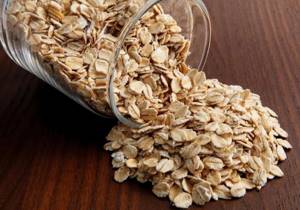
If you cook the cereal, then you need to bring it to full readiness so that it is completely boiled and turns out soft and tender, without rough particles. Usually the cooking time is indicated on the package. It is enough for Hercules to boil for 15 minutes. If you are preparing instant oatmeal, it will take 3-5 minutes to cook.
Smooth and fresh skin: dermaplaning, or why a woman needs to shave her face
"Dad is offended." Agata Muceniece about her relationship with Priluchny after the divorce
Women's jeans: before you buy them, you need to pay attention to one detail
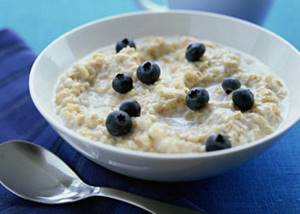
Crushed oats take the longest to cook. It is recommended to soak it for 1-2 hours and then boil for 30-40 minutes.
Why does oatmeal help in the fight against excess weight?
So, oatmeal really effectively helps to get rid of excess weight, and all thanks to its properties, which together become our best allies in terms of nutrition control and health care.
And now in more detail:
Oatmeal helps maintain healthy cholesterol levels
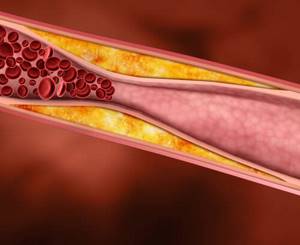
The high content of amino acids, fiber and unsaturated fats (such as omega-6 fatty acids - linoleic acid) help naturally reduce levels of bad cholesterol in the blood.
The level of good cholesterol, on the contrary, rises and is maintained at the required level. This allows you to lower blood pressure and get rid of excess weight.
Gives a feeling of fullness
Oatmeal is so effective in helping you fight excess weight not only because it helps regulate cholesterol and blood sugar levels, but also because oatmeal gives us emotional peace and balance, ensuring a feeling of fullness for a long time.
This is due to the high content of complex carbohydrates, which are slowly digested and absorbed by the body. And since it prevents spikes in blood sugar levels, oatmeal is very beneficial for those who suffer from diabetes.
Facilitates intestinal transit and helps get rid of toxins that poison our body
Due to its high fiber content, oatmeal improves intestinal transit and prevents constipation.
Thus, it absolutely naturally cleanses our body of accumulated fats and toxins , from which we not only gain excess weight, but also get sick (in the long term).
Nourishes tissues and the body as a whole
Oatmeal prevents our body tissues from weakening during weight loss. This is facilitated by such minerals contained in it as iron, sodium, zinc, potassium, folic acid, etc.
Prevents cancer development

Elements such as lignans and phytoestrogens help reduce the likelihood of developing hormone-related cancers (such as breast cancer).
Supports cardiovascular function
As mentioned above, beta-glucan is responsible for destroying and absorbing excess cholesterol accumulated in our arteries. This means that this substance improves the functioning of the cardiovascular system as a whole.
What are the benefits of raw oatmeal for the body?
The benefits of the described product are explained by its rich chemical composition. It contains almost all vitamin elements and contains large amounts of B1, B4, B5, B6, B9, E, H, PP. Oatmeal is rich in potassium, calcium, silicon, magnesium, phosphorus, iron, cobalt, manganese, copper, molybdenum, selenium, zinc, and amino acids.
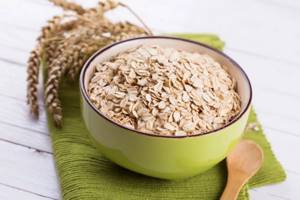
Cereals in general have a positive effect on the functioning of the nervous, digestive, and cardiovascular systems, improve metabolism, liver activity, and the condition of the skin and mucous membranes.
Helps lower cholesterol levels
Oatmeal contains the immunomodulating agent beta-glucan, which can reduce cholesterol levels, which are the cause of excess body weight, heart and vascular problems, and the development of diabetes. Its excess can lead to death in heart disease.
- Also among the beneficial effects of beta-glucan are the following:
- antitumor;
- antidiabetic;
- anti-infective;
- immunomodulatory.
For diabetes
It is recommended to eat oatmeal to reduce the risk of developing diabetes. There is also an opinion, supported by some studies, that the product in question regulates blood sugar levels. This is explained by the fact that it contains the already mentioned beta-glucan.
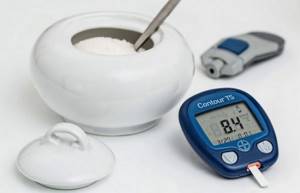
As a result of a series of tests, it was found that regular consumption of oatmeal helped to slightly reduce the amount of glucose in the blood.
However, it should be said that there are a number of studies that note the lack of influence of this product on this parameter. Also, some scientists have concluded that cereal reduces the body’s resistance to insulin in people diagnosed with type 2 diabetes.
For heart
The presence of fats and fatty acids in oatmeal helps improve hematopoiesis, heart function, and blood vessels. People who regularly eat this porridge in any form are at lower risk of developing cardiovascular diseases compared to those who eat it rarely or not at all.
In 2014, a study by the American Chemical Society was published, which provided data that the described cereal prevents the development of cancer and atherosclerosis, stops the formation of fat in the arteries and protects against stroke and heart attack.

The product in question is also included in the so-called. "Formula for healthy blood vessels." Scientists say that people who regularly consume olives, oatmeal and foods containing vitamins B6, B9, B12, such as lettuce, tomatoes, blueberries, fish, apples, almonds, and soy will have excellent vascular condition.
How can you include oatmeal in your diet?
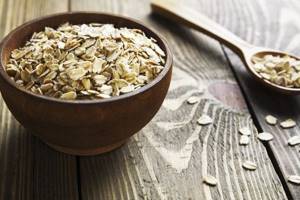
Making oatmeal a regular part of our diet can be quite a challenge at first. But it’s worth a try, as the results are really very noticeable and, most importantly, long-lasting.
“By far, the best oatmeal is one that is grown organically and maintains the integrity of its grains.”
And after you have mentally prepared yourself to eat healthy and have started eating oatmeal regularly, you should also try to exclude refined foods, sausages, fried foods and other unhealthy foods from your diet.
If, on the contrary, you “add” regular physical activity and training to oatmeal, then fat and excess weight will go away much faster .
Consequences of abuse
You need to know moderation in everything, and oatmeal is no exception to this golden rule. Otherwise, it may lead to bloating or cause diarrhea.
In addition, each serving contains about 300-400 calories, and this also needs to be taken into account when consuming oatmeal.
What oatmeal-based dishes can we prepare?
Since oatmeal is a cereal crop, it is quite versatile in terms of preparation. You can make many delicious dishes based on it; we have plenty of alternatives, you just need to use your imagination.
Just make sure that the amount of oatmeal you consume is moderate. In order not to exceed the calorie allowance, it is advisable to eat no more than two tablespoons of oatmeal per day.
We bring to your attention several ideas so that you can include oatmeal in your daily diet and at the same time choose the time when it will be most convenient, because it does not necessarily have to be porridge for breakfast.
Oatmeal water
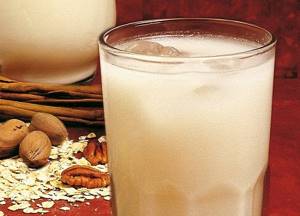
Drinking hot oatmeal water on an empty stomach is ideal for cleansing the body and removing toxins. And preparing such a drink is very simple: just soak oatmeal in water and leave overnight.
Add oatmeal to your favorite dishes
You can always sprinkle raw oatmeal onto salads or other dishes, for example. To do this, simply grind them (you can use a mill or coffee grinder).
Cream soups with oatmeal
You can always add some rolled oats to the blender with vegetables when making pureed soups. This way your dish will become richer not only in taste, but also in terms of nutritional value.
Cocktails and smoothies with oatmeal
By adding a handful of oatmeal to your cocktails and smoothies, you will not only start the process of cleansing the body, but also speed up the process of losing excess weight. Here are some options:
Banana, yogurt, oatmeal and honey smoothie
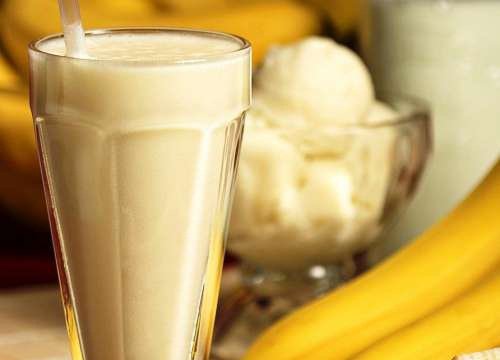
- 1/4 cup oatmeal
- 1/2 low-fat natural yogurt
- 1 banana
- 1/2 cup skim milk
- 2 teaspoons honey
- 1/4 teaspoon cinnamon
Berry smoothie with oatmeal
First you will need to mix the following ingredients and leave them for 5 hours:
- 1 and 1/2 tablespoons chia seeds
- 2 tablespoons oatmeal
- 3/4 cup plant milk
- 1/2 teaspoon almond essence
After the specified time has passed, add the following ingredients to your cocktail:
- 1/2 cup plant milk
- a handful of frozen strawberries (blueberries, cranberries, goji berries or any other)
- 1 tablespoon maple syrup (can substitute cinnamon or flaxseed)
If desired, you can add chopped banana. Mix everything well and the cocktail is ready! Believe me, you will be satisfied with the taste!
Yogurts with oat flakes
- 3 natural low-fat yoghurts
- 1/2 jar of low-fat cheese
- 10 pieces. hazelnuts
- 3 tablespoons oatmeal
- 3 tablespoons agave syrup
- fresh mint
The best thing about this recipe is that you can make it ahead of time.
Mix yogurt with cheese and mint and let it brew for a while. Chop the nuts and place them as a base, then pour the previously prepared mixture on top and sprinkle with oatmeal. You can sweeten it with agave syrup if you wish.
We hope that we have convinced you that oatmeal is indeed a very healthy product! Include it in your daily diet and enjoy the taste of new recipes!
Cereals
Oat flakes are made from oat grains by steaming and flattening, while partially preserving the cereal shell. Oatmeal varies in degree of purification, steaming time and thickness; the thinnest flakes cook the fastest, but they have practically no beneficial properties. Oatmeal has a light brown or golden color with darker veins and a light cereal aroma.
Porridge made from oatmeal is a traditional breakfast not only in England, but almost everywhere. Oatmeal cooks quickly, keeps you feeling full for a long time, gives you vigor and fills the body with energy.
Calorie content of oatmeal
The calorie content of oatmeal is 366 kcal per 100 grams of product.
Composition and beneficial properties of oatmeal
Oatmeal contains a large amount of coarse dietary fiber, which, when it enters the stomach, absorbs liquid, increases in size several times, and, passing through the intestines, takes with it unnecessary waste and toxins, thereby cleansing the body. Fiber normalizes intestinal motility, stimulates digestive processes and is a preventative against constipation. Oatmeal contains phosphorus, without which the energy necessary for the functioning of all body systems cannot be produced. The product helps to significantly reduce blood cholesterol levels and reduces the risk of cholesterol plaques on the walls of blood vessels. Including oatmeal in the diet prevents stroke, heart attack and atherosclerosis, increases the body’s protective properties, and normalizes the activity of the nervous system.
Harm of oatmeal
Oatmeal is not recommended for those diagnosed with celiac disease; sometimes individual intolerance to the product occurs.
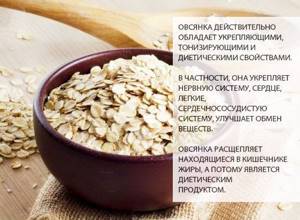
Oatmeal for weight loss
Despite the fairly high calorie content of the product, oatmeal cooked in water will not harm even the slenderest figure (calorizator). The uniqueness of oatmeal lies in the fact that the product is easily digested, and the complex carbohydrates that make up oatmeal satiate for a long time, and the body retains the energy received. Regular consumption of oatmeal normalizes digestion, so the weight loss process goes faster.
Which oatmeal is healthier?
When it comes to the benefits of oatmeal, it turns out that most people mean boiled or steamed Hercules flakes. Oats, like any grain crop, consists of a covering shell (bran), an intermediate layer of grain (endosperm) and a germ. Oat bran contains proteins, fiber, iron and B vitamins. These representatives also occur in the endosperm, but the main supplier of vitamins and minerals is still the embryo.
Oatmeal is also healthy and nutritious, but during the steaming process some of the properties inherent in whole grains are lost. In a healthy, nutritious diet, it is recommended to cook porridge from grains. It is clear that they take longer to cook, but you can buy crushed oatmeal.
Many people wonder how to cook oatmeal healthier: with milk or water. Simply steaming the cereal, as is done with cereal, will no longer work. Experts say that the healthiest porridge is cooked in water without adding salt or sugar. Especially when it comes to dietary nutrition. After all, oats will have to process milk fat first and only then in the human body. Its effectiveness will be reduced.
What can you combine oatmeal with?
It is best to cook oatmeal with milk. You can dilute it half and half with water if you wish. When preparing, it is permissible to take milk powder or cream. They must be diluted according to the instructions.

You can use fresh cream to prepare porridge. Use in the same way as milk, but first dilute with water. To prepare porridge, you can use condensed milk. However, it contains a lot of sugar, so you should add no more than 2 tablespoons of condensed milk per serving.
Found a violation? Report content
Oatmeal in the diet: only in the morning or 3 times a day
Fans of oatmeal enthusiastically tell everyone around them how much their condition has improved since they started eating it every day. Those who want to lose weight go on an oatmeal diet and consume oatmeal three times a day. Complex carbohydrates keep you feeling full for a long time, and the biotin contained in oatmeal has a beneficial effect on the skin, making it smooth and velvety to the touch. An oatmeal diet can even help cope with dermatitis. No wonder many women love the oatmeal face mask.
Despite all the positive reviews about the constant consumption of oatmeal, doctors do not recommend eating it several times a day. One hundred grams of oatmeal, subjected to minimal heat treatment, is the optimal amount that will deliver everything you need to your body. It is not recommended to eat oatmeal every day, because oats contain phytic acid, which interferes with the absorption of calcium and removes existing calcium from bone tissue. Therefore, no matter how comfortable it may be on an oatmeal diet, its duration should not exceed a week.
It is useful to eat oatmeal on an empty stomach, as it normalizes the functioning of the digestive tract. But when eating oatmeal for breakfast, you need to allow yourself an addition from a sandwich or fruit. It is best to eat such porridge for breakfast once every 2-3 days, alternating it with other cereals that are no less healthy.
It is generally accepted that there is no better breakfast than oatmeal.
simply doesn't exist. “Oatmeal in the morning is the key to health, a slim figure and energy for the whole day, because it is full of vitamins and microelements. It stimulates the functioning of the stomach and intestines,” say many nutritionists. But the body of many of us “dislikes” this porridge, and we hardly force ourselves to swallow it in the morning.
Cereal diet
The calorie content of cereals without additives is relatively low. They contain a lot of useful substances and satisfy hunger well. A special cereal diet has been created based on cereals to reduce body weight. This is a restrictive nutrition system that can be recommended for losing excess weight to people who do not have significant health problems. This diet is well tolerated. But, like any food system with a sharply limited range of products on the menu, this diet is unbalanced. It should not be followed for more than 7 days. A big advantage of the cereal diet is its cost-effectiveness. The essence of this nutrition system is that you can only eat porridge and drink plenty of water. The cereal will have to be cooked without salt, sugar, milk and butter. Not everyone will like this porridge, but it has few calories and almost no fat. Millet, buckwheat, wild rice, oats, and red lentils are suitable for a cereal diet. Do not use white rice, semolina or any instant cereal. All days of the diet for breakfast, lunch, dinner, eat 150 or 200 grams of any porridge. During the day, you can use 300 grams of vegetables (except potatoes) and 250 grams of low-fat fermented milk product. Drink green or herbal tea without restrictions. You can also drink clean drinking water.
For example, eat buckwheat porridge for breakfast, oatmeal and fresh tomato salad with a spoonful of yogurt and spices for lunch, lentil porridge and a glass of yogurt for dinner. Within 7 days of a grain diet, you will lose from 2 to 4 kilograms of excess weight. To increase the effectiveness of your diet and improve your well-being, add half an hour of exercise to your daily routine.
Cereals have not lost their importance in the diet of modern people. Carbohydrates, vitamins, and microelements in their composition are beneficial for metabolism and health in general. The calorie content of cereals is high enough to maintain strength throughout the day. When used correctly, cereals not only do not harm your figure, but, on the contrary, help you lose weight. The cereal diet is the most economical and easiest way to lose weight without harm to your health in a short period of time.
Calories and macronutrients in oatmeal
Oatmeal swells when cooked in liquid.
If you eat cooked oats, one cup will contain 166 calories, about 6 grams of protein, almost 4 grams of fat and 28 grams of carbohydrates, as well as 4 grams of fiber—16 percent of your daily value.
A cup of raw oats contains 307 calories, almost 11 grams of protein, a little more than 5 grams of fat, and almost 55 grams of carbohydrates, as well as more than 8 grams of fiber—33 percent of the daily value.
Mixing ½ cup of raw oatmeal with other foods such as yogurt and fruit will give you a more balanced breakfast with manageable calorie levels.
Ways to Use Raw Oats
You probably don't want to eat dry oatmeal, as it can lead to two potential problems:
First, when consuming fiber, you need to increase your fluid intake to avoid potential gastrointestinal problems such as gas and bloating. You can simply pour milk into the cereal or mix it in a blender.
Secondly, oats contain phytic acid, but cooking destroys the enzyme necessary to break it down. Phytic acid can combine with some of the minerals, making them unable to be absorbed. Soaking oatmeal overnight in milk and fruit will help reduce the amount of phytic acid and retain more of the beneficial elements.
Variety of dry oatmeal
Despite the wide range of oat flakes on supermarket shelves, the products are divided into three main types.
- Grainy or whole grain flakes are produced by pressing oat grains. This product swells slowly when soaked and takes a long time to cook. If you chew a small amount of these flakes in dry form, you can stop your stomach. This is especially true for people with sensitive digestion.
- Tender flakes are also produced using pressing technology, but finely chopped grain is used. These crackers swell faster and boil within a few minutes. If you experiment with eating dry oatmeal, it is better to use this type of product, despite the fact that its nutritional value is lower than that of grainy flakes.
- Instant flakes are made from finely ground oatmeal. They turn into a liquid substance once you mix them with water or milk. The flakes are used to prepare infant formula and liquid porridge for tube feeding. The product is high in calories because it is designed to increase muscle mass. Frequent use without physical activity can lead to weight gain.
Whole oatmeal contains healthy fiber. Non-digestible fiber improves intestinal motility. But if they are abused, the breakdown products will not have time to be eliminated from the body, will begin to accumulate in the intestines and lead to blockage.
Along with this, phytic acid contained in oat grains slows down the absorption of calcium. This leads not only to problems with bones and joints, but also to heart rhythm disturbances.
